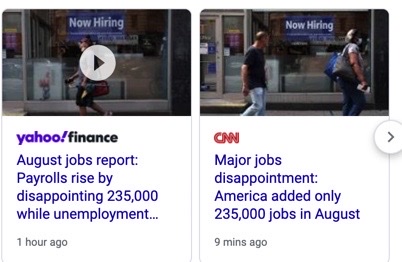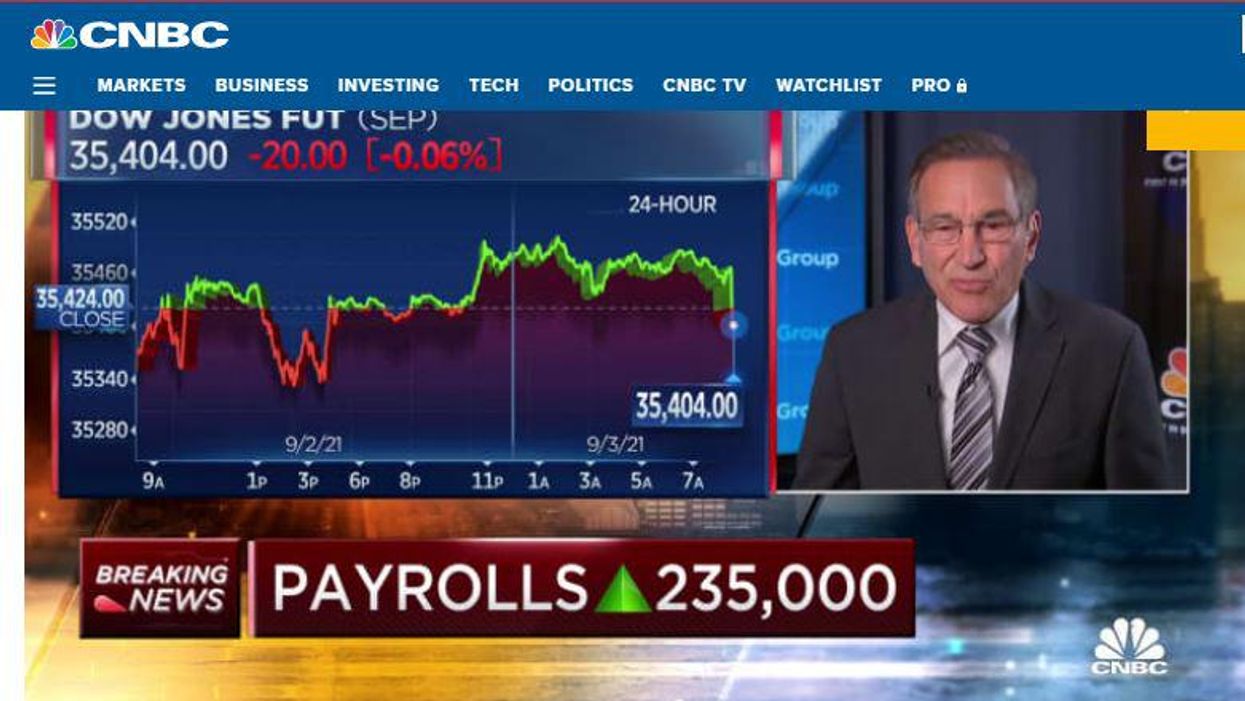What Major Media Got Wrong About That August Jobs Number
Reprinted with permission from DC Report
"Disappointing" is the consensus of newscasters about the August jobs report. They are wrong.
The economy added 235,000 jobs as Covid made a big comeback, especially in the South where governors spurn science and people stay away from bars, restaurants and shopping malls.
Most news reports lacked context about how rare it is to add that many jobs in a month. Most of the reports I read also failed to note that under President Joe Biden jobs are growing at more than triple the rate under Trump before the pandemic began.
Overall, the American economy is growing even faster than the six percent that Trump promised voters. Pre-pandemic, Trump delivered barely half that growth rate.
July was excellent with more than a million jobs added. In June, the economy added 962,000 jobs. That makes the August number seem small, but only by very short-term comparison.
Under Biden, the economy has added an average of 636,000 jobs per month, the federal Bureau of Labor Statistics "all employees" report CES0000000001 shows. That's close to 4.5 million jobs added since Biden became president on Jan. 20.
On Donald Trump's watch – before the pandemic – the economy added only 188,000 jobs per month. President Barack Obama did better than that once the collapsing economy he inherited turned around in early 2010; more than 200,000 jobs per month on average were added.
Genuinely Awful
 Looking at Trump's entire time in office, his jobs performance was genuinely awful. On Trump's watch, the economy lost an average of 2.8 million jobs per month. That's primarily because in March and April of 2020 the economy lost 22.4 million jobs.
Looking at Trump's entire time in office, his jobs performance was genuinely awful. On Trump's watch, the economy lost an average of 2.8 million jobs per month. That's primarily because in March and April of 2020 the economy lost 22.4 million jobs.
Since Ronald Reagan assumed office four decades ago, only one president has added an average of more than 235,000 jobs a month. That was Bill Clinton. During Clinton's eight years, the economy added an average of 242,000 jobs per month.
 Clinton did even better than those figures suggest because there were about 62 million fewer Americans on his watch. Adjust for that smaller population and the Clinton economy added the equivalent of about 297,000 jobs per month with today's population of 333.3 million people.
Clinton did even better than those figures suggest because there were about 62 million fewer Americans on his watch. Adjust for that smaller population and the Clinton economy added the equivalent of about 297,000 jobs per month with today's population of 333.3 million people.
In August, the economy added 37,000 manufacturing jobs. Under Trump 1,800 more factories closed. Thousands of factory workers lost their jobs, primarily because of his disastrous and ill-informed tariffs.
 The most interesting August job developments were in the delivery of goods compared with the traditional retail trade and in services like bars and restaurants.
The most interesting August job developments were in the delivery of goods compared with the traditional retail trade and in services like bars and restaurants.
Jobs in transportation and warehousing, which benefit from the home delivery of products, grew by 53,000 and brought the total to a modestly new high with 22,000 more such jobs than before the pandemic.
Retail employment – think clerks at malls – declined, with 29,000 fewer jobs in August and 285,000 fewer than in February 2020, before the pandemic.
Bars and restaurants shed 42,000 workers, evidently because fear of coronavirus infection is keeping more people at home. That number may worsen in the months ahead as the anti-vaxxers, sheep worm remedy users and mask refusers spread more gratuitous disease and death.
Trump Faltering In 2019

The Trump economy was faltering even before the pandemic, as I reported here citing official government data. Trump's overall economic performance was subpar, as I detailed from official government data in April 2019 when I gave Trump a grade of C for economic performance.
Candidate Trump repeatedly said he would produce 6% annual economic growth. He only got above 4% for one quarter. Even that was only because businesses stepped up purchases ahead of his disastrous tariffs.
After three years in office, economic growth under Trump was worse than every other president after Harry S Truman except for George H.W. Bush.
Under Biden, the economy grew at a 6.5% annual rate from April through June, the second quarter of this year. the Congressional Budget Office estimates that "real GDP will grow by 7.4 percent in calendar year 2021."
Happy Go Magic Land
Many Trump fans refuse to accept that Trump was bad for the economy and jobs even before the pandemic. These Trumpers seek solace in the childish fantasy world of Happy Go Magic Land.
And don't forget, Trump ran in 2016 promising to pay off the entire federal debt in eight years. Instead, during his four years, it grew and grew, in good part due its use to finance tax cuts for the wealthiest Americans and large corporations.
So read the 235,000 jobs added in context. It's a sharp fall from June and July, but that's mainly due to Covid making a comeback in states headed by Republican governors who deny science and thus kill their own citizens.
Viewed in context, the 235,000 jobs created in August are a clear positive for America.












